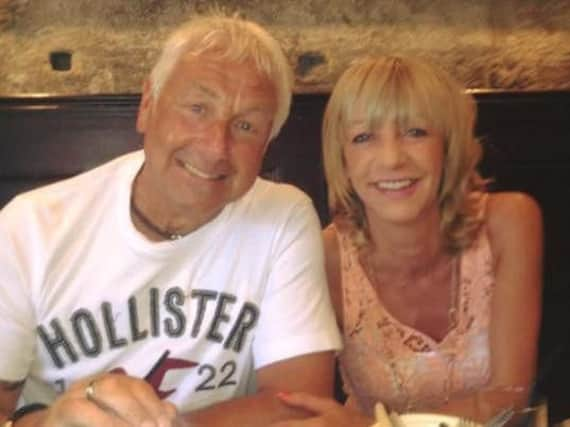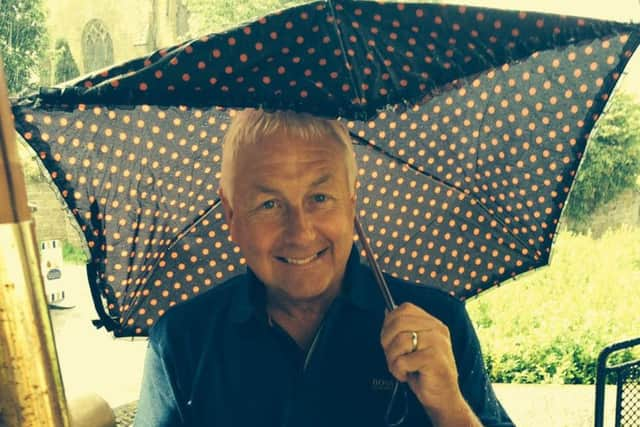Widow of Chesterfield man who died on holiday in Portugal speaks after inquest concludes


Chesterfield coroners' court heard David Robinson, 57, of Old Road, attended an emergency appointment with his doctor and complained of breathlessness, jaw pain and a strange sensation in his chest - two days before he was due to fly to Portugal with his wife Joanne Salt-Robinson in 2014.
According to Mrs Salt-Robinson, Dr Natasha Dhamija, a locum GP who saw Mr Robinson at Wheatbridge surgery on Wheatbridge Road, Chesterfield, told him to 'go away and enjoy your holiday'.
Advertisement
Hide AdAdvertisement
Hide AdDr Dhamija told Mr Robinson's inquest that she did not think the symptoms he presented with were cardiac-caused - and added that she did not recall a discussion about him going on holiday.


Mr Robinson - who had a family history of heart problems - sadly died in hospital in Faro on September 8, 2014, four days after undergoing a heart bypass.
'Dave was such a loving man'
Following the conclusion of her husband's inquest on Tuesday, Mrs Salt-Robinson said: "If we had known how serious Dave's condition was we would never have gone on holiday.
Advertisement
Hide AdAdvertisement
Hide Ad

"It is difficult not to think that if he had been referred to hospital for tests in August 2014 staff would have got to the bottom of his symptoms and he would still be with us today.
"Dave was such a loving man who adored life and lived it to the full.
"He is missed every moment of every day by all of his family and all that knew him."
Helen Jones, a specialist medical negligence lawyer at Irwin Mitchell, who represented Mrs Salt-Robinson, said: "The last four years have been incredibly difficult for Jo and all of her and David's family as they attempted to come to terms with his death.
"Jo has waited a long time to give her evidence.
Advertisement
Hide AdAdvertisement
Hide Ad"She attended the emergency appointment with David and she believes she made it clear to the GP that the couple were due to go on holiday to Portugal, something which was always denied by the GP.
"We will continue to support Joanne and the rest of the family at this distressing time."
'He was laughing and joking one minute and the next his heart had stopped beating'
Coroner Kathryn Hayes recorded a narrative conclusion.
Advertisement
Hide AdAdvertisement
Hide AdShe accepted that Mrs Salt-Robinson was present at the appointment and made the doctor aware that the couple was due to go on holiday, although she found that the doctor who saw Mr Robinson made an appropriate decision within her discretion.
Ms Hayes accepted that if Mr Robinson had been told not to travel to Portugal he would not have gone.
She found that while 'some medical intervention was certainly required, it was not necessary to undergo' a heart bypass on September 4, 2014, and therefore it was 'unlikely that he would have died on September 8, 2014, had he remained in the United Kingdom'.
'On the balance of probabilities', doctors in the UK would have 'stabilised' Mr Robinson if he had suffered a heart attack while they considered a 'long-term' solution to treat him, Ms Hayes found.
Advertisement
Hide AdAdvertisement
Hide AdMrs Salt-Robinson said: "During visiting on the day before Dave died he seemed to be making good progress.
"It was the first time in a week that he seemed to be more like himself.
"When it was time to say goodbye I checked with him that he was fine and he said he was so grateful that the doctors in Portugal had finally diagnosed him correctly and at least we could go back home and have a long and happy life together.
"After hearing that I was so happy as for the first time I was feeling positive about his progress and the future.
"The next thing I was being woken up by my phone.
"It was the hospital saying Dave had died.
Advertisement
Hide AdAdvertisement
Hide Ad"He had been laughing and joking with hospital staff one minute and the next minute his heart had stopped beating."
Coroner Kathryn Hayes' findings in full
"David Robinson suffered a heart attack on September 1, 2014, when on holiday in Portugal. He underwent a coronary artery bypass graft on September 4, 2014. On September 8, 2014, he died in hospital in Faro from a coronary artery dissection which was a direct consequence of the coronary artery bypass graft procedure.
"His heart attack probably began a few days after his GP consultation on August 29, 2014, during which he presented with symptoms that could have led to various diagnoses. It is not possible to say whether hospital attendance on August 29, 2014, would have altered either his presentation or his treatment prior to September 1, 2014. Nor is it possible to say whether such an investigation would have led to him remaining in the United Kingdom.
Advertisement
Hide AdAdvertisement
Hide Ad"However, had he remained in the United Kingdom it is unlikely - although not impossible - that he would have undergone the coronary artery bypass graft procedure on September 4, 2014. Accordingly, whilst his death was a recognised complication of a competently-performed medical procedure, and some medical intervention was certainly required, it was not necessary to undergo that particular procedure at this time and so it is unlikely that he would have died on September 8, 2014, had he remained in the United Kingdom. To that extent, but no more, the fact of being in Portugal was a causative factor in David's death.
"It is not possible to say anything about David's long-term prognosis had he not undergone the coronary artery bypass graft procedure on September 4, 2014. He had underlying ischaemic heart disease with severely blocked coronary arteries. There is insufficient information available about his myocardial infarction and too many uncertainties about how he may have responded to any treatment that might have been provided in the United Kingdom."